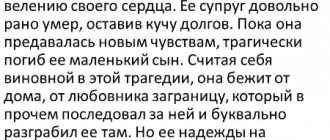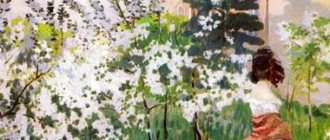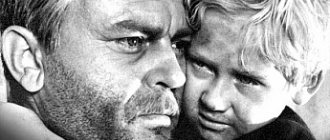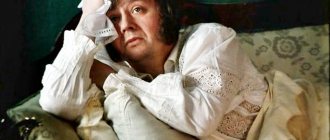- Essays
- On literature
- Chekhov
- The life story of Ranevskaya in the play The Cherry Orchard
Ranevskaya, along with Gaev, represents the image of old landowners who are gradually being swept away by a new way of life and new people, such as Lopakhin. Lyubov Andreevna is at a very mature age, she has adult daughters, her husband died from excessive infusions of champagne, after which Ranevskaya falls in love again and her little seven-year-old son dies, drowning in the river. After this, the landowner leaves for the Cote d'Azur with a new gentleman, where she lives until the events described in the play.
In fact, Ranevskaya returns to her estate from lack of money; she is not at all used to making money, which Lopakhin does excellently, and ultimately acquires the Cherry Orchard. Neither Ranevskaya herself, nor Gaev, nor Ranevskaya’s ex-husband, nor her daughters, nor her new lover know how to make money. On the contrary, for example, the lover turns out to be a rogue and a swindler, but the landowner does not want to notice this fact; she ends up actually returning to the gigolo, who left her without funds.
In her views, Ranevskaya adheres to the old way of life, she is quite conservative and does not want to accept the changes in the world that she observes. She calls renting plots for summer residents a vulgar business and cannot imagine such a way of earning money and handling the estate. However, she hopes to receive money from her aunt and also live in another country with this money, as she lived before.
In fact, Lyubov Andreevna is a rather spoiled person, but this is a feature of her upbringing, and not some kind of negative character inclination. Otherwise, this heroine is a pleasant and simple person who can get along with almost everyone. At the same time, Ranevskaya is prone to self-deception, in which she tries to find simple happiness, this fact is especially clearly confirmed by her relationship with her new lover, from whom there is only misfortune.
The landowner herself considers the death of her little son a punishment from Heaven for infidelity to her deceased husband, but continues to meet with a new gentleman. When he is more, he stays with him, when he ruins, he continues to believe. In the future, the landowner is going to return back to the Cote d'Azur and spend the remaining money there, again with this lover, and, as stated in the play itself, this money will not be enough for much, that is, in the end Ranevskaya will remain just a bankrupt landowner.
Heroine's story
You need to start characterizing Ranevskaya from “The Cherry Orchard” by getting acquainted with the history of her life. This will allow you to better understand the character of the heroine. And in the play itself, the reader learns about the events of her life from Lyubov Andreevna herself. At the very beginning it is said that Ranevskaya is returning from Paris with her youngest daughter Anya. Lyubov Andreevna spent five years in this city, and she did not return out of longing for Russia.
She had to return because their family estate with a cherry orchard could be sold for debts. Ranevskaya married some attorney at law who was not a nobleman. The husband did only one thing - drank a lot, and died from alcohol abuse (namely champagne). The reader understands that marriage to such a person hardly made the heroine happy.
She has a fleeting romance. Her son, being small, drowns, and, feeling guilty, Lyubov Andreevna goes abroad. But her lover leaves after her, and after several years of a passionate romance, he leaves her without regret. At the same time, he robs her, leaving her without a livelihood. After his betrayal, Lyubov Andreevna tried to poison herself, but, fortunately, the attempt was unsuccessful.
Her daughter Anna goes after her. And no matter how strange it may seem, this vulnerable and impressionable girl understands and feels sorry for her mother. Lyubov Andreevna lived in Russia for only 5 months, and after the sale of the estate she returned to Paris to her lover. This is the sad story of Ranevskaya from The Cherry Orchard.
The image of Ranevskaya
0
(0)
Ranevskaya's past
Noblewoman. Landowner. At one time, she “married a lawyer, not a nobleman,” and, according to Gaev, “she behaved in a very virtuous manner.”
Six years ago her husband died (“he drank terribly”), she fell in love with another man. A month later, seven-year-old son Grisha drowned. Ranevskaya couldn’t stand it and left. “Mom couldn’t bear it, she left, left without looking back.”
Her new lover followed her. She lived abroad for five years. I bought a dacha near Menton. He fell ill there, and she looked after him for three years. Then she went broke, sold her dacha, and went to Paris.
He robbed her and went to someone else. His love, by her own admission, tormented her. She tried to poison herself. “My soul has dried up,” she says about herself.
Anya tells Varya: “We arrive in Paris, it’s cold and snowy there. I speak French badly. Mom lives on the fifth floor, I come to her, she has some French ladies, an old priest with a book, and it’s smoky and uncomfortable. I suddenly felt sorry for my mother, so sorry, I hugged her head, squeezed her with my hands and couldn’t let go. Mom then kept caressing and crying...”
What a contrast this French home of Ranevskaya looks like compared to her estate: some people, it’s smoky, it’s uncomfortable. And in the middle of all this is a priest!
Let's think about it: Ranevskaya lost her son and, as Anya says, could not bear it, she left. But we note that she left her twelve-year-old daughter, leaving her in the care of nineteen-year-old Varya.
Having lost one child due to circumstances, she leaves the second of her own free will. She leaves the girl practically an orphan. From twelve to seventeen years old, Anya grows up alone. Then how exactly at this age (and not only at this age) a girl needs a mother! Did Ranevskaya think about this?
It is believed that Ranevskaya, returning to Russia, is running away from her unhappy love, just as she once ran away from her from Russia. But she doesn’t come on her own! Her daughter went after her (and what else?) Would Ranevskaya have returned to this house, to this so beloved garden in words, if Anya had not gone to her (for her) herself? Maybe, after all, there, in the smoky rooms, with a series of familiar and unfamiliar faces, she wasn’t as bad as she might seem now?
Maybe Varya is so unhappy because the whole house is left to her? She fulfilled her duty (this sounds too high), she helped Anya grow up, and who will help her? She was not used to relying on anyone, only herself. And to God. Maybe that’s why she became so devout because there was no help from people.
And uncle? Did he help? Why did the estate go bankrupt? No answer. But, on the other hand, it is on the surface. And who took care of him? Who needed it? Varya was unable to do this.
Ranevskaya's present
So, Ranevskaya returned home after a five-year absence. I'm glad to see my home again, because this is where she spent her childhood. “I slept here when I was little... And now I’m like a little girl...” (Laughs.) I want to jump, wave my arms... I can’t sit, I’m not able to... (Jumps up and walks around in great excitement.)
He speaks joyfully, through tears; cries, kisses Varya, brother, Dunyasha.
Her estate is ruined, an auction is scheduled for August 22, but she does nothing to save it. Moreover, despite the fact that she is ruined, Ranevskaya wastes money. He lends money to Pishchik and gives a hundred rubles to a stranger.
Anya says: “I also don’t have a penny left, I barely got there. And mom doesn't understand! We sit down at the station for lunch, and she demands the most expensive and gives the lackeys a ruble each as a tip.” Varya: “If she had her way, she would give everything away.”
The symbol of Ranevskaya and her life is coffee. Expensive, refined drink. Symbol of prosperity. She's broke, but she can't give up coffee. And he doesn't want to.
Ranevskaya about the garden
“What an amazing garden! White masses of flowers, blue sky..."; “The garden is all white. Oh my childhood, my purity! I slept in this nursery, looked at the garden from here, happiness woke up with me every morning, and then he was exactly the same, nothing has changed. (Laughs with joy.) All, all white! O my garden! After a dark stormy autumn and a cold winter, you are young again, full of happiness, the heavenly angels have not left you... If only the heavy stone could be removed from my chest and shoulders, if only I could forget my past!”
For Ranevskaya, the garden is the last outlet, the last refuge, the last happiness, all that is left for her. Ranevskaya cannot cut down the garden and destroy the house! Let us remember how she reacts to Lopakhin’s proposal: “Knock it out? My dear, forgive me, you don’t understand anything. If there is anything interesting, even wonderful, in the entire province, it is only our cherry orchard.”
Let's pay attention to the symbolism of color: the garden is all white. White - pure, untouched, spiritual, immaculate. “White color symbolizes purity, spotlessness, innocence, virtue, joy. It is associated with daylight... Associated with whiteness is the idea of the obvious, the generally accepted, the legal, the true.”
Looking at the garden, Ranevskaya exclaims: “Oh my childhood, my purity!” The White Garden is a symbol of the heroine’s childhood and purity, a symbol of happiness. But the last part of Ranevskaya’s monologue sounds tragic. She talks about the autumn and winter that the garden experienced. After autumn and winter, nature inevitably awakens and spring comes.
Leaves appear again, flowers bloom. “You are young again, full of happiness.” And the man? Man, unfortunately, is built differently. And we will never be able to say: “I am young again. Childhood, youth cannot be returned. It is impossible to forget the past. Misfortunes and sorrows cannot go away without a trace. A person probably cannot begin to live completely from scratch. That's why he's a man. And Ranevskaya’s last exclamation confirms this.
This is a pain that childhood has passed, youth has passed, moreover, life has passed, and not in the best way. And when did this happen? How, where and with whom did your life pass?
On the one hand, I’m very sorry for Ranevskaya. Especially at that moment when Petya Trofimov mercilessly throws it in her face: “Whether the estate is sold today or not sold, does it matter? It has long been finished, there is no turning back, the path is overgrown. Calm down, darling. There is no need to deceive yourself, you need to look the truth straight in the eye at least once in your life.”
For her, the garden is childhood, youth, happiness, and she cannot erase these memories, she cannot give up her garden so easily. “After all, I was born here, my father and mother, my grandfather lived here, I love this house, without the cherry orchard I don’t understand my life, and if you really need to sell, then sell me along with the orchard... (Hugs Trofimov, kisses him in the forehead). After all, my son drowned here... (Crying.) Have pity on me, good, kind man.”
But at the same time, Petya is right! Ranevskaya is too dependent on her memories, on her past. She doesn’t want to face the truth, doesn’t want to understand, for example, that the garden has long become a memory, and her lover is a scoundrel.
Of course, Trofimov is harsh. But he tells the truth, which Ranevskaya does not want to listen to.
It turns out there is no way out? There is an exit. You just need to stop and think, rethink your life, your actions, listen to yourself and make some effort on yourself.
I also remember Gaev’s words that his sister is vicious... What is Ranevskaya in reality? Why does her brother talk about her like that? One can only guess at some details.
Is Ranevskaya ready to change, is she ready to realize why she has all this? I think not. Varya, for example, says about her: “Mommy is still the same as she was, she hasn’t changed at all.”
Can the house where she spent her childhood and the garden help Ranevskaya find peace and regain her lost happiness? Let's pay attention to how she reacts to telegrams coming to her from Paris.
"Varya. Here, mommy, there are two telegrams for you... R a n e v s k a ya. This is from Paris. (Tears up the telegrams without reading them.) It’s over with Paris.”
Doesn't read the telegram. Is the past over?
Thus, no matter what the result of the auction was, Ranevskaya would still have left. This decision was made, as we see, much earlier than the sale of the estate. Neither “the whole white garden” nor anyone else would have helped her find happiness. She returned to her garden, but it is impossible to return to her youth and start all over again.
Does Ranevskaya have a choice? Without a doubt. I think a person always has a choice. Live the same way as before (with a scoundrel who robs and tortures her), or stay here. Yes, the garden will be sold (if she decides to do so), but something more important will remain. For example, daughter.
But, having stopped at a certain point, she did not move towards her happiness, but went in the same circle: Paris, he, tough love with betrayal, betrayal, scenes of jealousy, tears, the desire to commit suicide, “some French, ladies, an old priest with a book, and it’s smoky and uncomfortable.” After this, who should you blame for your failed life?
The future of Ranevskaya
Everything is clear with Ranevskaya’s future. But what kind of future does Ranevskaya prepare for her daughter Anya, still so young, open and naive? Some remarks make you think that Anya is very similar to her mother.
Probably just as dreamy, enthusiastic, wanting to fly and enjoy life. Ranevskaya, like her daughter, dreamed of happiness, love... And she didn’t think about the bad, and it seemed that there would never be troubles and adversity... Where did it all go if Ranevskaya was exactly like that? Did she think that life would turn out this way?
0 / 5. 0
.
The inner world of the heroine
When characterizing Ranevskaya from The Cherry Orchard, you need to try to reveal the contradictory character of the heroine. Lyubov Andreevna is attractive, kind, has a sense of humor, but at the same time she cannot be called an intelligent and sensible woman. After all, she does not seek to change the situation in which she finds herself. She rejects a reasonable solution that would not only save the family estate, but also improve the financial situation.
Of course, this was short-sighted on her part, but it showed her as a sentimental woman who could not agree to sell the house and cut down the cherry orchard because of the memories associated with it. Lyubov Andreevna is a very frivolous woman, because she does not think about the future, what will happen to her daughters, for her there is love, because of which she returns to Paris. And this can be considered not only as frivolity and stupidity on her part, but also as a hope that she too will have happiness. That is why the image of Ranevskaya in the play “The Cherry Orchard” turned out to be so controversial.
GENEROUS SOUL
In her last interview, Faina Ranevskaya said that what she values most in people is talent and kindness, and the second quality is much stronger. She called herself an “everyday fool” and was naive, gullible, ready to give her last. Once in Leningrad, during regular filming, Ranevskaya was visited by some old woman who allegedly introduced herself as her classmate from the Taganrog gymnasium. The impostor complained about her poverty, to which Faina Georgievna brought out her fur coat and gave it to her. She received the highest salary in the theater - 350 rubles a month, and as Evgeniy Steblov recalled, she gave half of it to friends and strangers in need.
Ranevskaya in the film “Easy Life”
Photo: kino-teatr.ru
Relationships with other characters
In characterizing Ranevskaya from The Cherry Orchard, a brief description of her relationships with other characters should be given. She has the closest relationship with her youngest daughter, who, due to her age, is an impressionable nature and understands and pities her mother. She has a close relationship with her brother, Gaev, because they are connected by common memories and kinship. Lopakhin is the complete opposite of Lyubov Andreevna, he is guided by reason, and she is guided by emotions. Despite the difference in characters, everyone sympathizes with Ranevskaya and tries to help her save the estate.
Ermolai Alekseevich Lopakhin
Ermolai Alekseevich Lopakhin - merchant. He was once a serf of the Gaevs, but thanks to his hard work, he managed to become a popular man and achieve material well-being. He is devoid of stinginess, envy and aggressiveness. He does not like to be idle, gets up early and works “by the sweat of his brow” until the evening. Lopakhin is a business man, a representative of the future bourgeoisie. However, in the pursuit of wealth, Ermolai Alekseevich lost something important - spirituality, a sense of true culture. He remains a flawed and insecure businessman, although human life is not alien to him: he sincerely tries to help Ranevskaya, persuading her to set up a holiday village in the garden and save herself from ruin.
You can “apply” the aphorism to him: from rags to riches. Soberly evaluates himself. Understands that money in life does not change a person’s social status. “A boor, a fist,” says Gaev about Lopakhin, but he doesn’t care what they think about him. He is not trained in good manners and cannot communicate normally with a girl, as evidenced by his attitude towards Varya. He constantly glances at his watch when communicating with Ranevskaya; he has no time to talk like a human being. The main thing is the upcoming deal. He knows how to “comfort” Ranevskaya: “The garden is sold, but you sleep peacefully.”
Lopakhin buys Ranevskaya’s family estate, which is not a “bone of discord” between them. They do not consider each other enemies; humanistic relationships prevail between them. Lyubov Andreevna and Ermolai Alekseevich seem to want to get out of this situation as quickly as possible. The merchant even offers his help, but is refused. When everything ends well, Lopakhin is happy that he can finally get down to real business. We must give the hero his due, because it was he, the only one, who was concerned about the “fate” of the cherry orchard and found a way out that suited everyone.
Relationship to the estate
In the characterization of Ranevskaya from “The Cherry Orchard,” one should also talk about how she relates to the orchard itself. For Lyubov Andreevna, it is associated with her happiest time in life - her childhood, youth. Walking along it, Ranevskaya saw herself as a little girl enjoying life. Therefore, she could not agree to sell it; perhaps this was the only thing that connected Lyubov Andreevna with Russia. Ranevskaya is one of the main characters of the play with a contradictory character, so she is one of Chekhov’s brightest heroines.
Varya
Varya is Ranevskaya’s adopted daughter. A good housewife, always at work. Varya is a realist. One might say, even a somewhat down-to-earth, peasant girl. He has feelings for Lopakhin, but is afraid to admit it. The whole house rests on it. A girl with strict views. Having taken on the difficult burden of caring for the household, I became a little hardened. She lacks subtle mental organization. Apparently, for this reason, Lopakhin never proposed marriage to her. Varvara dreams of walking to holy places. He does nothing to somehow change his fate. He trusts only in God's will. At the age of twenty-four he becomes “boring”, so many people don’t like him.
Epikhodov Semyon Panteleevich
Epikhodov - if there are “darlings of fate,” then he is the complete opposite. Something always happens to the hero, he is clumsy, unlucky and “offended by Fortune.” Despite a decent education, he does not know how to express his thoughts properly. He works in an office. He considers himself a developed person, but openly declares that he cannot decide whether he should “live” or “shoot himself.” Jonah. Epikhodov is pursued by spiders and cockroaches, as if they are trying to force him to turn around and look at the miserable existence that he has been dragging out for many years. Unrequitedly in love with Dunyasha.
Film adaptations
Judi Dench in the film “The Cherry Orchard”
In 1981, a film adaptation of Chekhov’s play called “The Cherry Orchard” was released in the UK. This is a drama film directed by Richard Eyre, starring actress Judi Dench as Ranevskaya. The role of the merchant Lopakhin was played by actor Bill Paterson.
In 1999, another dramatic film adaptation of The Cherry Orchard was released, this time a co-production between France and Greece. The film was directed by Greek director Michalis Kakoyannis, who also wrote the script. The film features music by Pyotr Tchaikovsky. Filming took place in Bulgaria. The role of Ranevskaya was played by British actress Charlotte Rampling, and the heroine's brother Leonid Gaev is played by actor Alan Bates.
Charlotte Rampling in The Cherry Orchard
The Russian film adaptation of Chekhov's play was released in 2008 under the title "The Garden" - and it is a comedy. Director and scriptwriter: Sergei Ovcharov. The role of Ranevskaya in the film is played by actress Anna Vartanyan. While working on the script, Ovcharov included only part of the play's material, but at the same time used in his work sketches of some of Chekhov's unwritten works, which were preserved in the writer's notebooks. The film contains elements of farce and commedia dell'arte. For example, the images of runaway servants in the film are based on the classic characters of the Italian square theater - Harlequin, Columbine and Pierrot.
Dunyasha
This girl is a simple servant, but she has ambitions and demands. Living with the gentlemen, I lost the habit of simple life. Doesn't know peasant labor. As a rule, the details of her wardrobe are not much different from the outfits of a society lady. However, the essence of man remains the same. Therefore, even among the pompous gloss, one can discern the fact that Dunya is a peasant. Her attempts to look more respectable are pathetic. Afraid of everything. He falls in love with Yasha, not noticing that he is simply unable to share love with someone.
Speech characteristics
The heroine's statements are very emotional. This has a special charm and attractiveness. Appearing in the first act, she speaks almost exclusively in exclamations. Her remarks are accompanied by the author’s remarks: “crying”, “through tears”, “kissing”. Short sentences end with exclamation marks and ellipses.
This is due not only to the excitement of the meeting. Even after this, Ranevskaya speaks with feeling and confusedly, rarely constructing detailed, long statements. In essence, she does not know how to fully and comprehensively substantiate her opinion or express her thoughts. Speech reveals confusion, inconsistency, and unclear feelings.
Portrait description of Ranevskaya from “The Cherry Orchard”
If we take up the description of the artistic portrait of the main character, then we are faced with an image that at first glance seems very sweet and attractive. Ranevskaya really rejoices very sincerely and touchingly, has fun, and sometimes sheds tears when remembering her childhood or her son who died.
What was Ranevskaya really like? “The Cherry Orchard” (including the characterization of the heroine) literally immediately, in just a few strokes, makes it clear all the frivolity of her nature. She behaves too artificially, so one can immediately doubt the sincerity of her experiences.
She constantly jumps up and walks around, very excited, says that she cannot survive this joy, while kissing the closet and saying: “Laugh at me, I’m stupid...”.
The characterization of Ranevskaya (“The Cherry Orchard”) suggests that she is self-critical and quite smart, but accustomed to living at other people’s expense. She is no longer able to change anything about herself, so she has become a slave to circumstances, whims and the worthless person who robbed her.
Ranevskaya herself understands that she is a spendthrift who quickly and senselessly wastes money, while her adopted daughter Varya feeds her household with milk soup, and the old people in the kitchen are given only peas.





